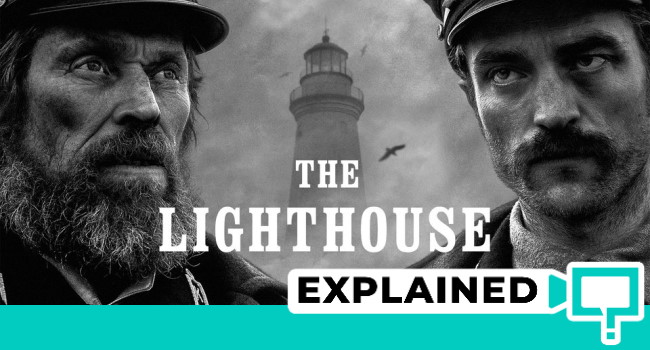There are not many movies out there that are so thought-provoking and open to interpretation as Robert Egger’s The Lighthouse. This tale about two lightkeepers left on an isolated island for what seems to be several weeks can be seen as a chilling Lovecraftian horror or an intense psychological drama. The movie is rich with motifs from religion, mythology, and psychoanalysis. It also brings up numerous ethical, sociological, and moral issues. With that in mind and without further ado, here’s what some of the movie’s most significant scenes, symbols, and allegories mean – the plot and ending of The Lighthouse explained; spoilers ahead.
Hollywordle – Check out my new Hollywood Wordle game!
Where To Watch?
To find where to stream any movie or series based on your country, use This Is Barry’s Where To Watch.
Oh, and if this article doesn’t answer all of your questions, drop me a comment or an FB chat message, and I’ll get you the answer. You can find other film explanations using the search option on top of the site.
Contents
Here are links to the key aspects of the movie:
- – A Promethean Surrealist-Horror Based on a True Story
- – The Effect of Isolation
- – Micro-Microcosm of Society
- – What actually happened?
A Promethean Surrealist-Horror Based on a True Story
By the majority of critics, this movie is classified as a Promethean surrealist horror. Now, the two central Promethean motifs here are the mystery of the lighthouse and the ending sequence of Winslow dying on the rocks with a seagull nibbling on his skin. The latter is quite obviously Promethean, seeing as how the mythological titan Prometheus ended up tied to the Caucasus with an eagle tearing his liver.
The light itself represents both fire and secret knowledge. After all, Zeus didn’t condemn Prometheus for stealing fire but for stealing the secret of knowledge that he should not have had access to. In this regard, if we compare Wake to Zeus, we could also interpret Winslow’s defiance as a Freudian revolt against a father figure.
One of the most interesting theories here is the one about Wake and Winslow being the same person. The sentence “Why’d you spill yer beans” is arguably the strongest argument in favor of this theory, seeing as how the Wake is suddenly gone as soon as Winslow is done confessing his guilt. The fact that it is uttered by Wake’s disembodied voice is both eerie and indicative that not everything is as it seems. With this theory in mind, it becomes a lot easier to accept that Wake’s take on the boat-smashing scene is more than just common gaslighting.
Arguably the biggest Lovecraftian symbol in the movie is definitely the one regarding the mermaid. While a more common theory regarding the mermaid is that it’s just a figment of Winslow’s sexual fantasy, others see it as a sinister force haunting the island. According to this theory, Winslow summoned the mermaid once he found the scrimshaw. However, this might also be interpreted as the trigger that kickstarted his sexual fantasy.
The Lighthouse: The Effect of Isolation on Human Psyche
One of the most obvious theories of what really transpired in the movie revolves around the idea that all the isolation made Winslow go insane. It would be quite easy to see how the psychological effects of isolation amped up his paranoia to the maximum and even toyed with his perception of reality.
The first four weeks were quite hard to endure, but when the relief did not arrive, the burden of isolation became even heavier. Being able to see an end to any labor or trouble has an alleviating effect on the human psyche. But without a foreseeable end, even simple cognitive processes of keeping track of days become quite daunting.
The sequences of the duo drinking, arguing, singing together, brawling, etc., are quite interesting and hard to imagine under normal circumstances. In regular society, you would have several different people to act as your employer, roommate, confidante, drinking buddy, rival, etc. Here, Winslow and Wake are forced to fill all of these roles for one another.
The sound of the foghorn made viewers uneasy, which is precisely why the director chose to focus so heavily on it. Did historical lighthouses use fog horns? Absolutely! So, why is this so underrepresented in other movies featuring lighthouses? Well, because here, it has another purpose. At the same time, it represents the dread and monotony that come with isolation.
Even visually, the island is meant to look desolate and barren. Had the two been sent to a remote farmhouse with lush layered landscaping, things would not have been nearly as bad. However, this was not the case. The director’s decision to film the movie in black and white further adds to this.
Micro-Microcosm of Society
One of the more interesting aspects of the movie is the fact that the lighthouse represents a micro-microcosm of society. Even though there are only two people on the island with seemingly similar duties and societal status, from the very beginning, Wake, the elderly lighthouse keeper, asserts his authority over his younger colleague.
The Promethean theme that we previously mentioned can also be interpreted through the lens of sociology. The person of authority has this mythical secret knowledge that the subordinate has no access to. Despite the fact that Winslow did all he was told, including painting the lighthouse, emptying chamber pots, and numerous other menial tasks, Wake still described him as an incompetent drunk. This is a metaphor for an older authoritarian figure unjustly preventing his younger subordinate’s upward mobility.
Lastly, the symbol of escaping your past by going to a remote location resembles elements from Joseph Conrad’s novels, most notably Heart of Darkness and Lord Jim. Here, Winslow also changes his identity in order to start on a clean slate. However, his violent, antisocial nature reemerges. This also aligns with the theory of both Wake and Winslow being the same person. According to this interpretation, the other lighthouse keeper would be a personification of his conscience urging him to “spill the beans.” It would also fit the theory of this island actually being Winslow’s purgatory.
The Lighthouse: What actually happened?
During one interview, Robert Pattinson admitted to asking Eggers what was really going on in the movie. Was it just an imagination, isolation-induced hallucinations, mystical force in the lighthouse, etc.? The director outright refused to answer, saying that the plot is whatever the actor (or any other viewer) wants it to be. In other words, the director deliberately made room for various interpretations of the story. This is similar to the ending of Filth, where the viewer is left to decide what happens to James McAvoy’s character.
When talking about the objective events of the movie, it’s important to mention that the inspiration for the story came from a real-life event called Smalls Lighthouse Tragedy that took place in 1801. Two lighthouse keepers, Tomas Howell and Thomas Griffith, were in charge of the lighthouse when Griffith suffered a freak accident and died. Fearing that he would be accused of murder if he disposed of the body, Howell just left it near the lighthouse. This decision was so emotionally taxing that, by the time Howell was rescued, he was in a dire state mentally.
It wouldn’t be that much of a stretch to assume that the concrete events of the story went somewhere along the lines of the Smalls Lighthouse Tragedy.
In Conclusion
The biggest problem with interpreting the ending of The Lighthouse is the fact that you can understand it in several completely different ways without any of them being completely wrong. You can see the lighthouse as a purgatory for Thomas Howard’s tormented soul. You can also take it at face value and see it as an ordinary lighthouse tale, with an emphasis on the psychological effects of isolation in eerie conditions. Lastly, you can also see it as a Lovecraftian tale of horror from the deep.
Seeing as how the ending is deliberately left open, there are no definitive answers. Still, sometimes, the quest to seek the answer can be more rewarding than actually answering the question.
What were your thoughts on the plot and ending of The Lighthouse? Drop your comments below, let’s discuss.

Stacey is a talented freelance writer passionate about all things pop culture. She has a keen eye for detail and a natural talent for storytelling. She’s a super-fan of Game of Thrones, Cats, and Indie Rock Music and can often be found engrossed in complex films and books. Connect with her on her social media handles to learn more about her work and interests.

